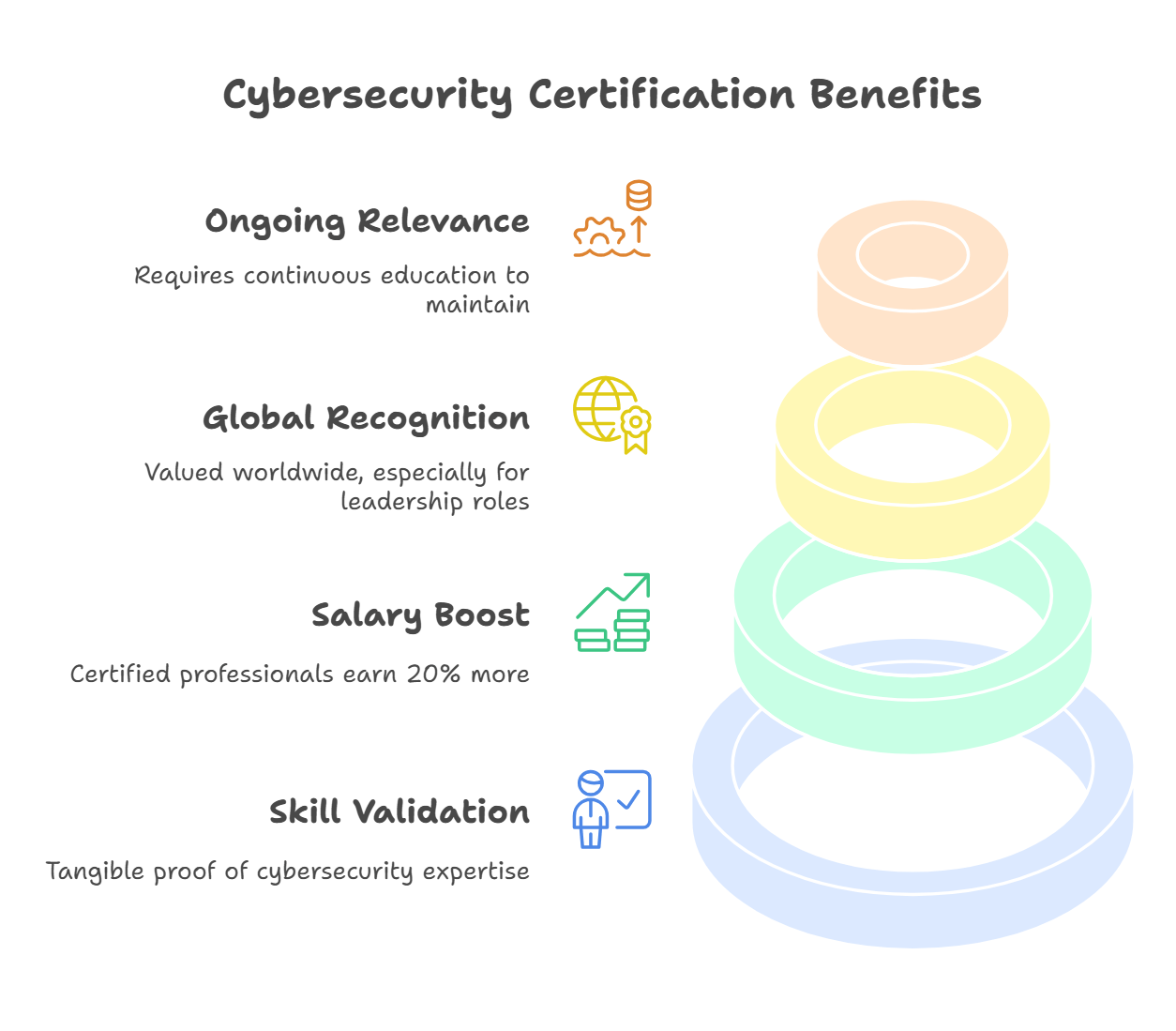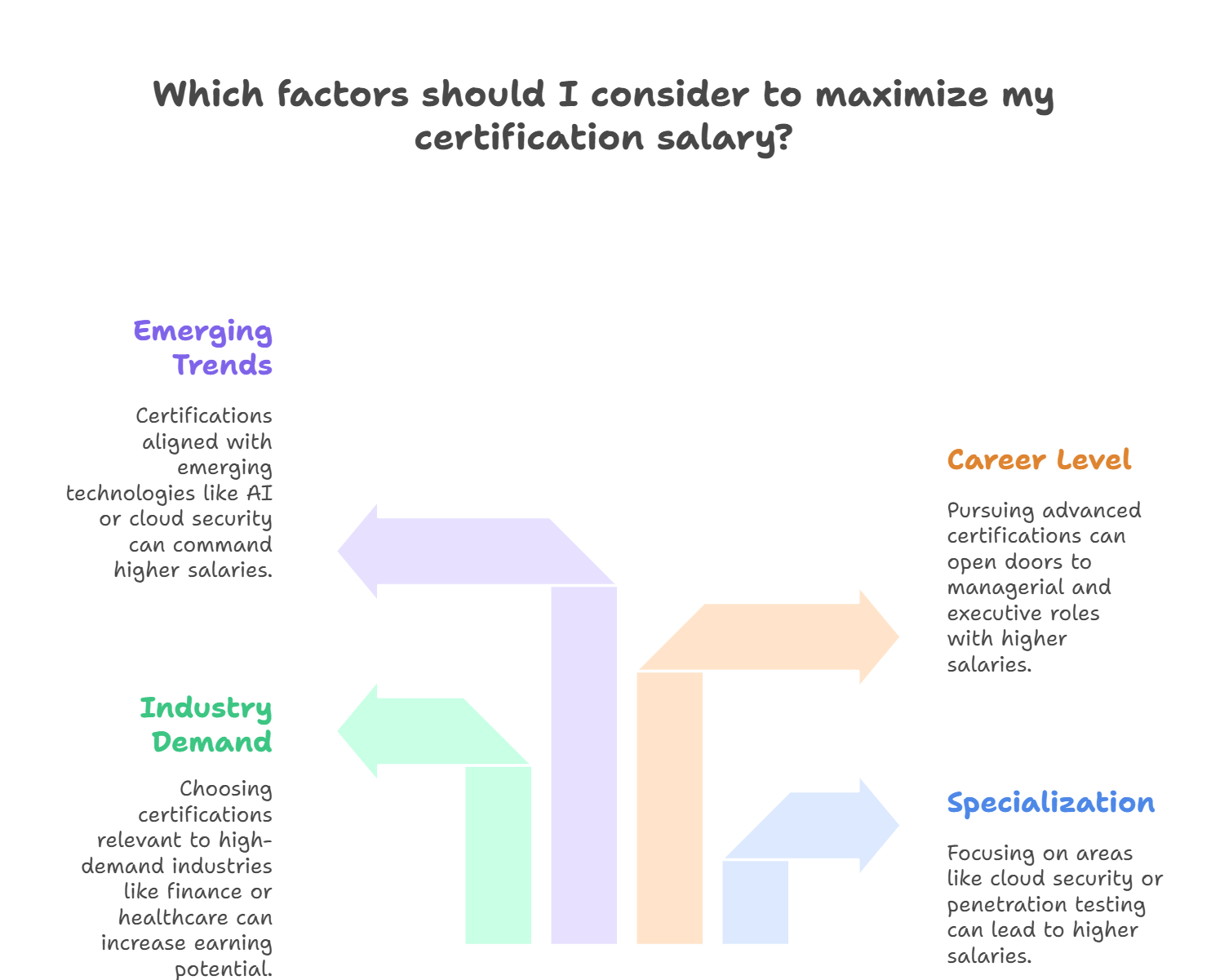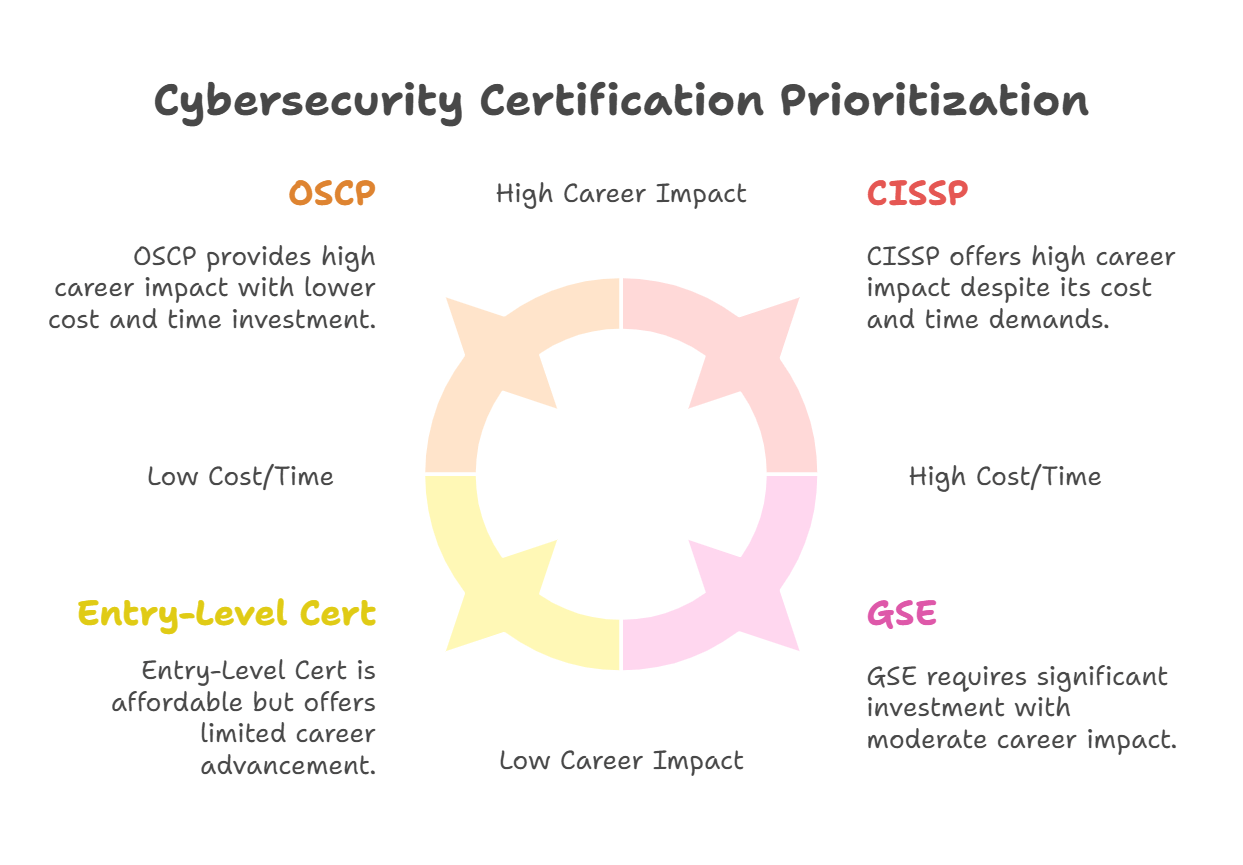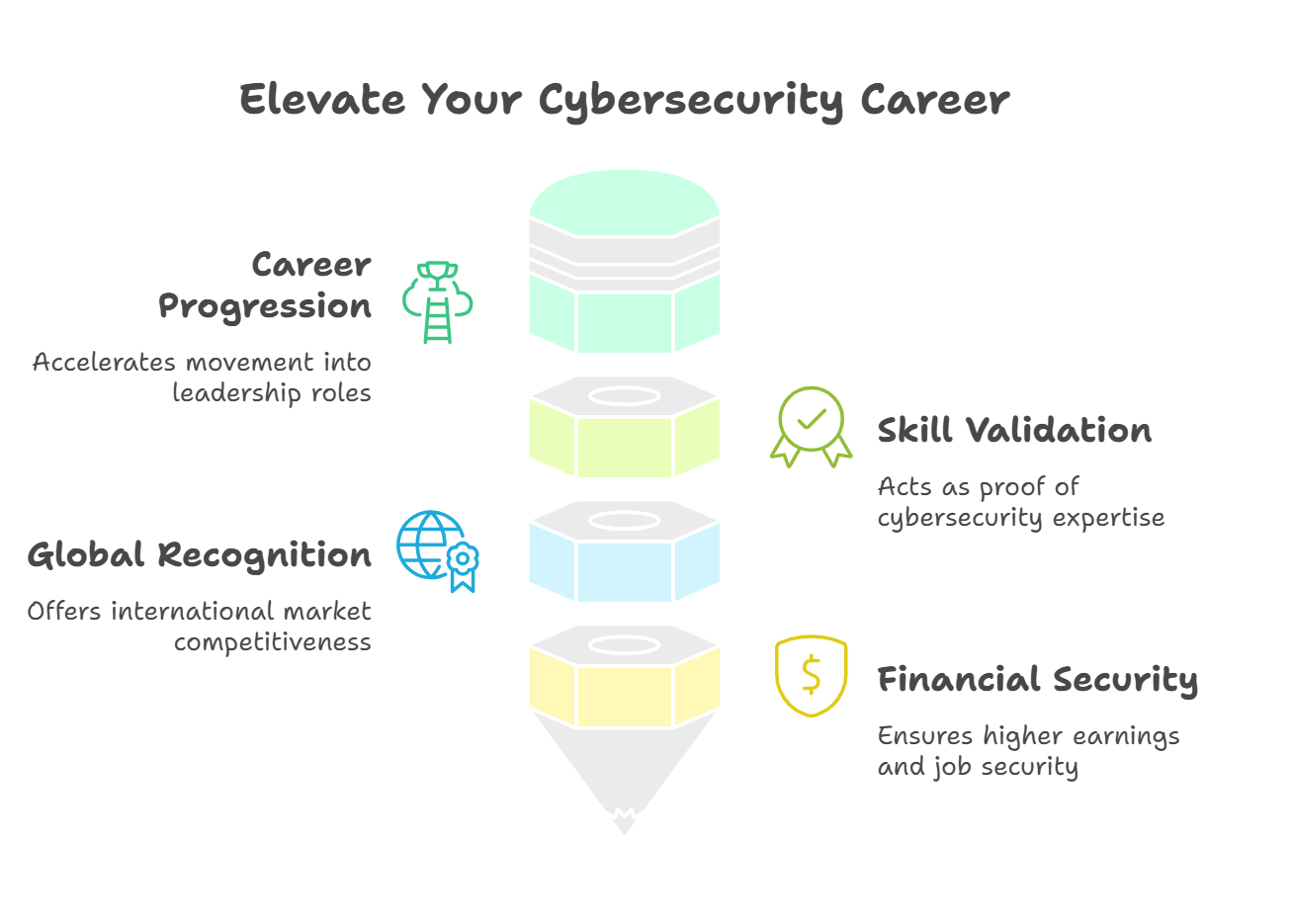Table of Contents
- Why the Right Cybersecurity Certification Matters
- 1. Proves Your Skills and Expertise
- 2. A Gateway to Higher Salaries
- 3. Industry Recognition
- 4. Ensures Continued Relevance
- Key Factors That Drive Certification Salaries
- Which Cybersecurity Certification Pays the Most?
- How to Choose the Highest Cybersecurity Certification
- Benefits of High-Paying Cybersecurity Certifications
- Final Thoughts
- Frequently Asked Questions
Cybersecurity is one of the most dynamic and rewarding fields in the modern job market. As cyber threats grow more frequent and sophisticated, the demand for skilled cybersecurity professionals has skyrocketed. Whether you are an aspiring IT expert or a seasoned professional looking to elevate your career, certifications play an essential role in demonstrating your skills, gaining credibility, and advancing to higher-paying positions.
The ultimate question that often arises in this industry is: “Which cybersecurity certification pays the most?” The answer is multifaceted and depends on several factors, including your career path, specific roles, industry, and your level of experience. While certifications like CISSP and CISA are widely recognized and respected, specialized credentials and complementary certifications such as the Cybersecurity Certification Test and the ACSMI Certification can provide added depth and expertise. This guide will help you navigate the highest-paying cybersecurity certifications and how they align with various career roles.
Why the Right Cybersecurity Certification Matters
Cybersecurity certifications are essential in establishing your credentials in a competitive field. They validate your knowledge, expertise, and the practical skills needed to tackle emerging cybersecurity challenges. Whether you’re trying to break into the field or climbing up the professional ladder, the right certification makes a significant difference in your earning potential and career growth. Here’s why:

1. Proves Your Skills and Expertise
Certifications serve as a tangible validation of your skills. They showcase your proficiency in addressing key cybersecurity challenges and your ability to safeguard sensitive data. Employers are more likely to trust certified professionals, which gives you a competitive edge in a crowded job market.
2. A Gateway to Higher Salaries
The earning potential for certified cybersecurity professionals is higher than that for non-certified professionals. According to various industry reports, certified individuals typically earn 20% more than their non-certified counterparts. The right certification not only opens doors to higher-paying roles but also accelerates career advancement.
3. Industry Recognition
Certifications that are globally recognized, such as CISSP or CISM, are highly valued by companies worldwide. These credentials are often a requirement for advanced roles, particularly in leadership and management positions. Holding one of these certifications signals to employers that you meet global standards of expertise.
4. Ensures Continued Relevance
Cybersecurity is a rapidly evolving field. To stay relevant, professionals must constantly update their knowledge. Certifications often require ongoing education or recertification, ensuring that you stay up-to-date with the latest developments, tools, and practices.
Key Factors That Drive Certification Salaries
Understanding which certifications pay the most requires insight into the factors that influence the earning potential of cybersecurity professionals. The salary you can command is determined by various elements, including the availability of Free Cybersecurity Certification Reddit discussions that highlight valuable credentials:

1. Specialization
Cybersecurity is a vast field, and certain specialized areas, such as cloud security, penetration testing, and incident response, command higher salaries. Professionals who specialize in addressing critical organizational challenges are often rewarded with lucrative salaries. For example, experts in cloud security or DevSecOps are highly sought after due to the increasing shift towards cloud computing and integrated development practices.
Certifications such as AWS Certified Security Specialty or GIAC Security Expert (GSE) focus on these specialized areas, offering a higher earning potential compared to general certifications.
2. Industry Demand
The demand for cybersecurity professionals varies by industry. Some sectors, like finance, healthcare, and government, have stringent cybersecurity requirements, driving the need for highly skilled professionals. Certifications that align with global standards, such as CISSP, CISA, and CISM, are particularly valuable in these regulated industries.
Additionally, sectors like cloud computing and e-commerce also demand cybersecurity specialists, particularly in areas like cloud security and data privacy, making certifications like CCSP (Certified Cloud Security Professional) highly lucrative.
3. Career Level
The level of certification you pursue significantly impacts your salary. Entry-level certifications like CompTIA Security+ or Certified in Cybersecurity (CC) provide a solid foundation for junior roles, whereas advanced certifications like CISSP, CISM, and GSE open doors to managerial and executive roles. As you move up the career ladder, your earning potential increases exponentially.
Roles such as Chief Information Security Officer (CISO), Security Architect, and Cybersecurity Director require high-level certifications and carry salaries upwards of $150,000 annually.
4. Relevance to Emerging Trends
Cybersecurity certifications that align with emerging technologies or industry shifts tend to command higher salaries. With the growing reliance on cloud infrastructure, certifications like AWS Certified Security Specialty or Google Cloud Security Professional are becoming more valuable. Similarly, the rise of AI-based cybersecurity is creating a demand for certifications that focus on AI-driven threats and machine learning techniques.
Specializing in new areas ensures that you stay ahead of the curve and qualify for the highest-paying roles in cybersecurity.
Which Cybersecurity Certification Pays the Most?
If you’re looking for the highest-paying cybersecurity certifications, here are the top certifications that consistently offer lucrative career opportunities:
1. Certified Information Systems Security Professional (CISSP)
-
Average Salary: $135,000/year
-
Why It Stands Out: CISSP, awarded by (ISC)², is considered the gold standard for cybersecurity professionals. It validates a comprehensive understanding of cybersecurity principles, including risk management, security architecture, and identity management. CISSP is ideal for those aiming for leadership positions in IT security.
-
Who Benefits: Those looking to move into enterprise-level cybersecurity leadership roles or consultancy.
2. GIAC Security Expert (GSE)
-
Average Salary: $150,000–$180,000/year
-
Why It Stands Out: GSE is one of the most prestigious and challenging certifications in cybersecurity. This certification is designed for elite professionals with hands-on experience in penetration testing, vulnerability assessments, and forensics. GSE is recognized for its demanding exams and comprehensive coverage of cybersecurity topics.
-
Who Benefits: Experienced penetration testers and cybersecurity experts seeking to demonstrate their expertise at the highest level.
3. Certified Information Security Manager (CISM)
-
Average Salary: $130,000/year
-
Why It Stands Out: CISM, offered by ISACA, is one of the top certifications for those focusing on risk management, governance, and compliance. It emphasizes aligning IT security with business goals and managing a security team. This certification is highly valued by employers looking for professionals who can manage security at an organizational level.
-
Who Benefits: IT Directors, Senior Security Managers, and professionals seeking to move into cybersecurity leadership roles.
4. Offensive Security Certified Professional (OSCP)
-
Average Salary: $115,000–$125,000/year
-
Why It Stands Out: OSCP, offered by Offensive Security, is one of the most respected certifications in ethical hacking and penetration testing. It is known for its hands-on nature, requiring candidates to perform live penetration tests during the exam. OSCP is ideal for those pursuing careers in offensive security and penetration testing.
-
Who Benefits: Penetration testers and ethical hackers who want to demonstrate their practical skills in real-world environments.
How to Choose the Highest Cybersecurity Certification
Choosing the best Cybersecurity Certification Philippines involves considering several factors that align with your career goals. Here’s how to make the best choice:

1. Career Role Compatibility
Each certification is designed for specific roles. For example, CISSP is ideal for security management and leadership roles, while OSCP is geared toward penetration testers and ethical hackers. Consider your career aspirations and choose a certification that aligns with your desired job function.
2. Relevance to the Industry
Cybersecurity is an evolving field, and certain industries require specialized certifications. For example, cloud security is critical in industries migrating to the cloud, so certifications like AWS Certified Security Specialty or CCSP are valuable. Understanding the industry’s cybersecurity needs will guide you to the most relevant certification.
3. Certification Costs and Time Commitment
While some certifications, like CISSP and GSE, are costly and time-consuming, they offer higher earning potential in return. Evaluate your budget and career timeline before pursuing a certification. Consider how long it will take to prepare for the exam and how the investment aligns with your long-term goals.
4. Impact on Salary and Career Advancement
Certifications like CISSP and CISM can significantly boost your salary, opening doors to senior management roles. The GSE certification can propel you into the highest-paying roles, especially in penetration testing and vulnerability assessments.
Benefits of High-Paying Cybersecurity Certifications
Certifications that pay the most provide more than just a higher salary. They offer numerous professional advantages that help elevate your career and ensure long-term success:

1. Faster Career Progression
High-paying certifications eliminate growth barriers, helping you move into leadership roles faster. With certifications like CISSP or CISM, you can secure managerial positions and make strategic decisions that impact the organization’s security.
2. Skill Validation
Certifications act as proof of your skills, showcasing your ability to handle both fundamental and advanced cybersecurity challenges. Employers are more likely to promote professionals with validated expertise, accelerating their career growth.
3. Global Recognition
Global standards like CISSP or CISM provide international recognition, making you a competitive candidate not just locally but also in global job markets.
4. Financial Security
Certified professionals earn significantly more than non-certified counterparts. A higher salary not only provides immediate financial benefits but also ensures long-term job security in a competitive industry.
Final Thoughts
The highest-paying cybersecurity certifications, including CISSP, CISM, and OSCP, set you apart in an industry that is constantly growing and evolving. Each certification offers its unique value, but combining these with complementary programs such as the ACSMI Certification ensures you have the depth and breadth of knowledge needed to tackle emerging challenges.
By strategically investing in the right certifications, you position yourself for lucrative roles, accelerated career growth, and the expertise to defend against evolving cyber threats. Now is the perfect time to take charge of your career and unlock incredible opportunities in the cybersecurity field!
Frequently Asked Questions
1. Is CISSP considered the highest cybersecurity certification?
Yes, CISSP is often regarded as the highest cybersecurity certification due to its rigorous curriculum and global recognition across various industries. However, specific roles may require additional specialized certifications.
2. What is the most difficult cybersecurity certification to obtain?
The GSE (GIAC Security Expert) certification is widely considered the most difficult, requiring extensive experience and preparation. It includes both written exams and hands-on challenges, making it suitable for seasoned professionals.
3. Are high-level certifications necessary for beginners?
Not necessarily. Beginners should start with foundational certifications like CompTIA Security+ or Certified in Cybersecurity (CC), which lay the groundwork for future certifications such as CISSP or CISM.
4. What’s the longest validity period for a cybersecurity certification?
Certifications like OSCP are valid for life. However, certifications such as CISSP or CISM require renewal every 3 to 4 years through CPE (Continuing Professional Education) credits.
5. Can I combine ACSMI Certification with other credentials?
Yes, ACSMI Certification is designed to complement other industry-standard certifications. With its flexibility and over 400 modules, ACSMI provides comprehensive expertise that aligns with certifications like CISSP and OSCP.

Leave a Reply